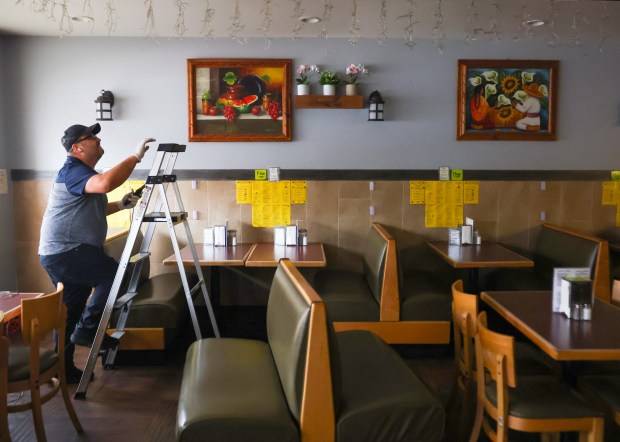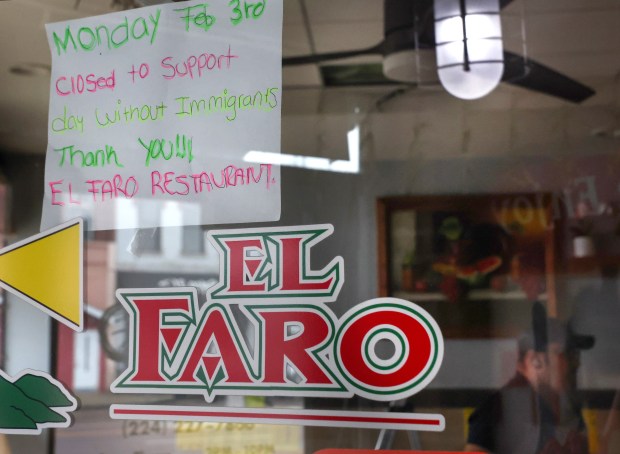A churro shop in Pilsen closed its doors Monday. So did a Mexican grocer in Chicago Heights. The owner of several Mexican restaurants in Elgin, himself the son of immigrants, shut his business for the day, too.
As immigrant communities across Chicagoland entered a third week of fear and uncertainty in the shadow of President Donald Trump’s immigration crackdown, some business owners and workers from Elgin to Chicago Heights took action Monday: They closed their businesses and stayed home from work. The goal, they said, was to send a message about the contributions immigrants make to their communities and local economies.
The closings were part of a national Day Without Immigrants, a protest movement, spread on social media, that encouraged immigrants and members of their communities to stay home from work and school and refrain from shopping in protest of Trump’s promise of the largest deportation operation in United States’ history, which has gripped Chicago-area immigrant communities in fear for the last two weeks. The protests caused business closings across the country in cities from San Francisco to New York.
Adolfo “Junior” Bello, the owner of El Faro, a small Mexican restaurant chain in Elgin, was one of the local business owners who closed his doors Monday. He told the Tribune he was shutting his restaurants in support of the immigrant community.
“We’re here for them. We feel their pain,” said Bello, whose parents came to Chicago from Guanajuato and Michoacan, Mexico.
Bello’s parents opened their first restaurant in 1984. He and his seven siblings all waited tables, picked produce, washed dishes and shucked tomatillos for the family establishment. Bello, now 46, took over the business at age 19, he said.
Through running the restaurant, he said he’s seen first-hand how many people are staying inside because of Trump’s immigration crackdown. Bello said the restaurant’s closing was a statement of solidarity. In the long run, he hopes for an overhaul of the immigration system.
“A lot of our customers have been here forever. I don’t really know their status, but we know that they’re scared. They have family members that are scared,” he said. “We even have family members that are not legal. They’re hiding.”
In Pilsen, David Fernández closed his printing business, Concord Press.
Fernández, who is also a board member for the Pilsen Chamber of Commerce, says he is one of dozens of businesses that he knows of that closed in the neighborhood Monday.
“18th Street is empty, no foot traffic. I counted 34 closed businesses in a 2-mile drive on 18th Street between Damen and Halsted,” Fernández said, noting that many businesses have signs on their doors saying they’re closed for the day.
Nubia Chavez, owner of the Mexican Grill and Bar Pollo Locuas in Blue Island, said she thinks almost all Hispanic-owned businesses in Blue Island were closed for the day.
Chavez, who opened Pollo Locuas 24 years ago to provide jobs for her siblings, immigrated to the U.S. from Mexico at 15.
Having lived in the U.S. without documentation for 10 years before getting her green card, Chavez said she understands the fear gripping the undocumented community.
“I was one of them 35 years ago, so I know the feeling,” she said.
Shortly after Trump’s inauguration, some Chicago-area workers stayed home from their jobs in fear, scared ICE might make arrests at their workplaces. On Monday, some stayed home in defiance.
Representatives for some local workers centers and labor unions told the Tribune they were aware of the protest but had not endorsed it. Some said they were not aware of their members participating in the protest by not showing up to work.
But Marcos Ceniceros, executive director of Warehouse Workers for Justice, said a significant number of local warehouse workers had decided to stay off the job. About 100 workers at a warehouse in suburban Franklin Park, which Ceniceros declined to name, decided to stay home, he said. So did some workers at other suburban warehouses, he said.
The workers, some of whom have been here for decades, feel frustrated by anti-immigrant rhetoric and actions they’ve experienced in the last weeks, Ceniceros said.
Last week, Warehouse Workers for Justice said, several suburban warehouses were visited by federal immigration officials, which rattled workers, though most warehouses did not let the agents inside and only one person was arrested. ICE did not immediately respond to a request for comment about immigration enforcement in the suburbs last week.
“They want the company they work for and the places they shop to feel that frustration they’re feeling,” Ceniceros told the Tribune.
Cristobal Cavazos, executive director of Immigrant Solidarity DuPage, which operates a workers center based in Wheaton, said a majority of the workers who belong to the center did not work Monday. Instead, he said, the group held a rally and march in West Chicago.
Workers center Arise Chicago did not participate in the protest, said Shelly Ruzicka, the group’s communications and finance director. She said Arise was concerned that workers who participate could be retaliated against by their employers.
“Employers could take advantage of this as a way to fire workers … So if anyone is doing (the action), they should do it in a collective manner — communicate that to their employers,” she said.
Immigrants make up a significant share of the Illinois labor force. About 14% of the population of Illinois is foreign-born, according to the American Immigration Council.
Immigrants make up a slightly greater share of the state’s labor force, with more than 1.1 million immigrant workers making up 17.6% of the workforce. And 300,000 members of the Illinois workforce are undocumented immigrants, according to the Pew Research Center.
“Chicago has always been a city of immigrant workers, regardless of status,” Chicago Federation of Labor President Bob Reiter said in a statement. Reiter said the labor organization stands with businesses and workers opposed to Trump’s immigration agenda, which he described as “deeply anti-worker.”
“Immigrants work in every sector of our economy and every part of the city,” he said.
Experts have rung alarm bells about the wide-ranging impact mass deportations of undocumented workers could have, not only on immigrant families but on the economy as a whole.

Undocumented immigrants paid more than $96 billion in taxes in 2022, according to researchers with the Center for Migration Studies. If businesses can’t fill jobs because of mass deportations, prices could go up, experts have warned. And if undocumented people aren’t earning money, they won’t be putting their wages back into the local economy, they said.
Jaime Di Paulo, the president and CEO of the Illinois Hispanic Chamber of Commerce, said he understands the impulse behind Monday’s protest, but is worried it could hurt immigrant communities. A Mexican immigrant himself, Di Paulo said he knows his community is scared and that people feel the need to take action.
But the protest seemed to mostly involve the shuttering of Latino-owned businesses, Di Paulo said.
“It seems to me like the impact is just happening in our communities,” he said.
In Gage Park, tire shop owner Martin Cruz said he’s seen firsthand the impact immigration policies have had on his business, and he has a hard time believing that a crackdown on immigration will do anything but hurt the economy. He closed his business for the day.
Cruz, who lives in Bolingbrook, came to the United States from Mexico in 1981. He said he has a green card.
He remembers the Immigration Reform and Control Act passed by Congress in 1986 — which gave lawful permanent residence status to undocumented people. It helped his business, he said, because it expanded the pool of car buyers.
“Giving benefits to immigrants and creating legal pathways helps promote growth,” he said.
Many of Cruz’s customers at the Gage Park tire shop are undocumented, he said. He works every day, even on the weekends, to make his services available to people who work irregular hours.
Since targeted immigration enforcement operations began in Chicago, Cruz said, he’s noticed that the shops around his business have been closed sporadically. People only go out for what is absolutely necessary, he said.
Cruz has four stepchildren, 19 grandchildren and five great-grandchildren and told the Tribune he never imagined this would be their reality.
“They’re living in a city where their neighbors are scared to go outside,” he said.



